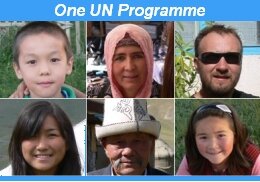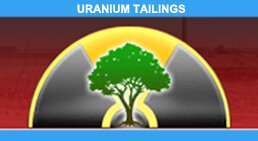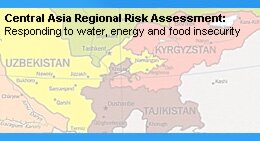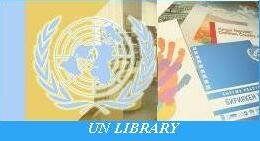The background, briefly, is as follows: on 10 June, a wave of deadly violence began in the multi-ethnic city of Osh in southern Kyrgyzstan. Over the course of several days, the violence continued in the city, and spread to the surrounding district of Kara Suu and neighbouring Jalal-Abad Province. As of 16 June, the Ministry of Health had recorded 187 deaths in the conflict, with 1,966 people injured. However, senior government figures and the ICRC have stated that the true number of casualties may be several times higher than this. There have also been extensive reports of sexual violence. In addition, the areas affected have seen widespread arson, looting of state, commercial and private property, and destruction of infrastructure. The violence has calmed somewhat in the last two or three days. But the situation remains tense and volatile, and many people remain barricaded in their areas or their homes, too frightened to go out. There is an urgent need for the full restoration of law and order and for reconciliation efforts between communities to start immediately.
The violence has had acute humanitarian consequences for well over a million people. An estimated 400,000 people, in a country home to 5.2 million, have fled the conflict in Osh and Jalal-Abad. Of these, as many as 125,000, including children, have sought refuge in neighbouring Uzbekistan, while 300,000 are displaced in Kyrgyzstan itself, many taking shelter with friends and neighbors.
The response from the Governments and others in Kyrgyzstan and Uzbekistan is of course the first and most important response. We welcome the fact that Uzbekistan opened its borders on 12 June to admit refugees fleeing from the violence in Kyrgyzstan, and has so far provided aid with much generosity. I trust that the border will continue to be open as necessary.
We also acknowledge the significant role of citizens of Kyrgzystan in providing shelter and basic help to the displaced. However, both Governments have also made it clear that they need and welcome international assistance.
Numerous Governments in the region and well beyond have also already been generous in their rapid mobilization of logistical support, relief items, and funds. The United Nations and its partners have deployed additional staff to both countries. But there is still a huge amount to do to ensure that the response is as well-coordinated, as rapid and as effective as we can possibly make it in difficult circumstances.
The United Nations and its partners are responding to the requests from the Governments for humanitarian assistance by releasing aid already in country and urgently bringing in both more supplies and additional staff. However, most international humanitarian agencies have not yet been able to start activities in a major way in southern Kyrgyzstan because of the insecurity.
We are particularly grateful meanwhile for the role that the ICRC and local representatives of the Red Cross/Red Crescent movement have been able to play so far. Against this background of difficult access to the affected areas in Kyrgyzstan, fully assessing the situation in this area is an urgent priority to make sure that the right humanitarian aid can be delivered quickly. An initial visit from a UN team on 17 June suggested that, while the situation in Osh and elsewhere remains extremely fragile and tense, we can establish as an initial step, a humanitarian base at Osh airport, and work from there. We plan to use the existing UN offices and national staff in Osh as conditions hopefully improve, and step up our operations as increasing freedom of movement for international and national staff allows, as long as the security situation permits this. I am confident that we will see a major increase in UN activities as from tomorrow.Meanwhile, supplies from the UN are already arriving in Osh airport.
The Flash Appeal we are launching today is seeking $71 million to provide life-saving assistance over six months to 300,000 people displaced by the conflict in southern Kyrgyzstan, and up to 765,300 people who have been otherwise affected, such as those in host communities or communities devastated by the conflict. I am allocating $8 million from the Central Emergency Response Fund (CERF) to give immediate support to some key projects in the appeal. The main elements of the appeal are as follows:
• Food Security and Agriculture: 21,700,000
• Community Restoration : 11,950,000
• Protection: 11,148,715
• Shelter : 10,310,647
• Health: 6,375,000
• Education: 3,590,000
• Water, Sanitation And Hygiene: 3,155,350
• Logistics : 1,390,553
• Coordination Support Services : 850,000
• Telecommunications: 675,374
In recognition that, as always in the early stages of a crisis, and particularly given the access problems and lack of capacity in-country before the crisis, there are still some unknowns, the Flash Appeal will be revised in around one month, at the latest. We then hope to be able to present a more complete picture of current humanitarian needs, as well as of early recovery requirements. Meanwhile, I urge you to contribute to the Flash Appeal to ensure assistance to those affected can get moving without delay.
In addition, as I have mentioned, needs arising from the influx of refugees into Uzbekistan are now being assessed by a team which has been on the ground for the last two days. Details of funding and other needs, including a Flash Appeal next week, and a corresponding allocation from CERF, will be available soon.
Excellencies. Ladies and Gentlemen. Some final thoughts to conclude.
All concerned, in the region and more widely, need to do all they can to calm the situation and restore full peace and stability to those who have been so badly affected, indeed traumatized, by this event. In particular, I urge Kyrgyzstan and Uzbekistan, to continue to work together as closely as possible in the humanitarian response and other areas.
For our part, I am confident that the reformed humanitarian system is more than ever able to respond to the humanitarian challenges we face today in Kyrgyzstan and Uzbekistan. The cluster approach has already been mobilized in Kyrgyzstan. The need for specific humanitarian leadership on the ground is being addressed. We urgently need more capacity on the ground from all parts of the humanitarian system, including NGOs, so that together we can address the needs of those who require our help, and support the Governments in this crisis, which any country would struggle to respond to single-handedly. We can do nothing however without the necessary resources. Let me therefore urge all donors and supporters again to respond generously to ensure that this Flash Appeal for Kyrgyzstan attracts the resources so urgently and desperately needed by so many people.
Thank you.








